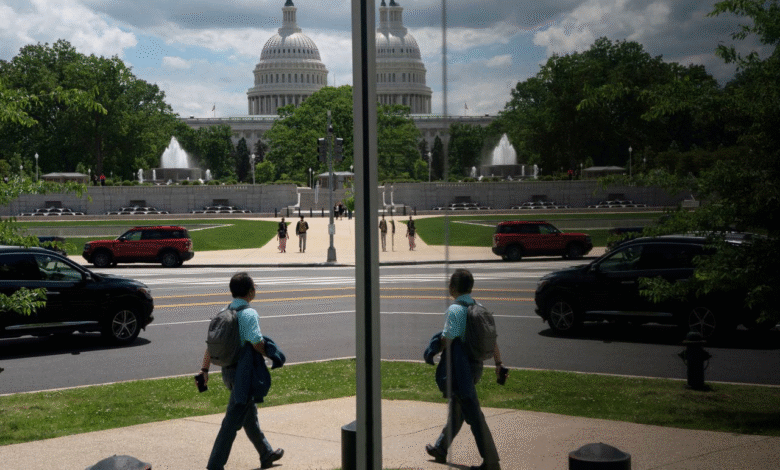Republican Megabill: Targeting Immigrant Finances and Benefits

The Republican Megabill, formally known as the “One Big Beautiful Bill Act,” has emerged as a controversial piece of legislation that aims to significantly alter the financial landscape for immigrants in the United States. This sweeping bill not only seeks to strip immigrant households of access to critical benefits like the child tax credit, but it also introduces a 3.5% tax on remittances — money that immigrants send back to their families abroad. Moreover, the legislation imposes hefty fees for essential services, including a $1,000 application fee for asylum seekers, making it more difficult for vulnerable families to seek safety. Economists emphasize that these changes will exacerbate challenges faced by both legal and undocumented immigrants, potentially destabilizing their economic well-being. With such sweeping financial implications, the Republican Megabill represents a pivotal moment in the ongoing debate surrounding GOP immigration legislation and its impacts on immigrant finances.
The proposed Republican legislation, often referred to as the “One Big Beautiful Bill Act,” reflects a growing trend in GOP policy aimed at reshaping the dynamics of immigrant financial support. This ambitious megabill seeks not only to limit access to essential tax benefits for families but also to implement new financial burdens that could discourage legal immigration pathways. Key provisions include tax hikes on remittances, which directly affect immigrants sending money home, alongside the introduction of application fees for asylum and temporary protection statuses. As the landscape of immigrant finances shifts under these policies, analysts warn of the potential for increased hardship, particularly among those relying on federal assistance as they navigate their legal statuses. Ultimately, the discussions surrounding this legislative package signify a broader debate within the Republican Party about immigration reform and its intended economic strategies.
Impact of the Republican Megabill on Immigrant Finances
The Republican Megabill, known officially as the “One Big Beautiful Bill Act,” poses significant challenges to the financial well-being of immigrants in the United States. By stripping access to vital tax benefits, such as the child tax credit, this legislation stands to disproportionately affect immigrant households, particularly those who are legal residents or documented. Economists emphasize that this shift not only complicates budgeting for families but also exacerbates the existing financial barriers faced by many immigrant communities, who often rely on such benefits to support their children and manage their living expenses.
Moreover, the proposed tax on remittances adds another layer of strain on immigrant finances. Often, immigrants send money back to family members in their home countries, and imposing a 3.5% tax on these remittances can significantly reduce the amount of money that reaches loved ones abroad. As these families face increasing financial challenges, the interplay of these new taxes and removal of benefits could potentially lead to a cycle of economic hardship, as noted by experts in the field of immigration and financial policy.
Child Tax Credit Restrictions Under GOP Legislation
One of the most contentious aspects of the Republican Megabill is the proposed restriction of the child tax credit. This change seeks to impose stricter eligibility parameters that would leave many immigrant families, particularly those without Social Security numbers, unable to claim tax credits for their children. Such limitations are alarming since they target low-income families who heavily depend on these credits to alleviate expenses related to raising children in the U.S., further highlighting the bill’s focus on tightening the financial grasp on immigrant households.
This revised approach risks permanently impacting over a million children who are U.S. citizens or legal residents. They stand to suffer from a lack of financial support during formative years, threatening their educational and developmental needs. Critics argue that these changes are not just political maneuvers but actual legislative actions that can dismantle the economic stability of immigrant families, increasing the gap between them and socio-economic equity.
New Fees for Asylum Applications and Their Consequences
The proposed fees for asylum applications under the Republican Megabill represent a significant shift in how immigrants interact with the U.S. immigration system. With a $1,000 application fee introduced where there were previously none, this move could dissuade vulnerable individuals from seeking asylum, effectively reducing legitimate claims. Historically, the asylum system has operated on the principle of providing refuge and safety, yet these financial hurdles can skew this principle.
The introduction of additional fees for Temporary Protected Status and other immigration avenues can severely hinder those already experiencing trauma and barriers to residence in the U.S. and force many to reconsider their aspirations for a safe life. The cumulative effect of these new fees could lead to an increase in undocumented immigrants or those living in limbo, further complicating the existing immigration landscape.
Tax on Remittances: A Burden on Immigrant Families
The GOP’s proposed tax on remittances serves as another financial burden on immigrant families who contribute significantly to the economies of both the U.S. and their home countries. By instituting a 3.5% tax on money sent abroad, lawmakers are increasing the costs associated with supporting their families. For many immigrants, each dollar sent is critical to the survival of family members back home, and this tax will diminish their ability to help those in need.
This new taxation could create a chilling effect on remittance flows, potentially reducing the overall financial support received by families in their countries of origin. As research indicates, remittances play a vital role in poverty alleviation and economic stability in foreign nations, and a reduction in these funds could have broader implications for global financial health, particularly in developing countries.
Doubling Down on Immigration Restrictions: GOP Immigration Legislation
The comprehensive immigration reform advocated by the GOP reflects a growing trend of tightening immigration policies and limiting financial assistance programs for immigrant families. This shift underscores a strategic pivot towards prioritizing fiscal conservatism over humanitarian frameworks, as the legislation seeks to enforce stricter immigration controls while simultaneously making essential services less accessible.
By focusing on self-sustaining immigration services, the aim is to financially fortify the enforcement of immigration laws rather than offer support and integration avenues for immigrants already residing in the U.S. Detractors of the bill argue that this approach not only penalizes immigrant communities but also undermines the American values of inclusivity and opportunity.
The Role of Economic Policy in GOP Immigration Legislation
Central to the discussion around the GOP Megabill is the underlying economic policy that informs its proposals. Republicans argue that tighter immigration controls and tax reforms serve to create a fiscally responsible environment conducive to overall economic growth. However, this perspective raises significant questions about equity and inclusivity in economic participation for immigrants.
As the GOP pushes forward with measures that include cutting spending on safety net programs, many fear the widening economic disparities that may ensue. The promise of tax relief benefiting wealthier households seems at odds with the tightened restrictions and reduced financial resources that immigrant families will face, leading to increased scrutiny over the true beneficiaries of such economic policies.
Future Implications of the Republican Megabill
The potential passage of the Republican Megabill could usher in an era of tightened financial constraints for immigrant households. With proposed changes that limit tax benefits, introduce new application fees, and tax remittances, the ripple effects could be felt far beyond the immediate fiscal challenges faced by these families.
Looking ahead, the impact of this legislation may lead to increased advocacy and resistance from immigrant rights groups advocating for equitable financial policies. As discussions continue, the legislative landscape will undoubtedly face challenges from various demographics seeking to safeguard the rights and economic futures of immigrant communities.
The Perception of Immigrant Finances in American Politics
The ongoing debate surrounding the Republican Megabill brings to light deeply entrenched perceptions of immigrant finances within American political discourse. Part of this narrative frames immigrants as burdens on the economy, which has generated support for legislation that seeks to restrict financial benefits and impose new fees.
However, many studies illuminate the contributions of immigrants to the economy, including their roles as entrepreneurs and essential workers. Reevaluating the narrative around immigrant finances is crucial, as it shapes the policies that directly influence millions of lives and reflects broader societal attitudes towards diversity and inclusion.
Strategies to Combat Financial Disparities for Immigrants
In response to the challenges posed by the Republican Megabill, various advocacy groups are strategizing ways to combat the financial disparities that immigrants might face. By raising public awareness and mobilizing community efforts, these organizations aim to protect the rights and resources available to immigrant households, ensuring their financial stability amidst changing legislation.
Additionally, offering financial literacy programs and resources tailored specifically for immigrant communities can equip them with the knowledge needed to navigate these new challenges. As the legislative landscape evolves, proactive measures will be critical in safeguarding immigrants’ financial lives and supporting their contributions to society.
Frequently Asked Questions
What is the impact of the Republican Megabill on immigrant finances?
The Republican Megabill, officially known as the “One Big Beautiful Bill Act,” aims to complicate immigrant finances by significantly limiting access to tax benefits like the child tax credit, imposing a 3.5% tax on remittances, and introducing fees for asylum applications, which could affect both legal and undocumented immigrants.
How does the GOP immigration legislation affect the child tax credit?
Under the Republican Megabill, the GOP seeks to permanently restrict the child tax credit for children without Social Security numbers, impacting an estimated 1 million children, primarily those who are U.S. citizens or legal residents but have parents lacking these identifiers.
What new taxes will be introduced for immigrants under the Republican Megabill?
The Republican Megabill proposes a new 3.5% tax on remittances sent abroad by immigrants, adding a financial burden on those supporting family members in other countries.
Are there any fees for asylum seekers in the Republican Megabill?
Yes, the Republican Megabill proposes a $1,000 application fee for asylum seekers, along with higher fees for Temporary Protected Status applications and charges for persons apprehended without proper entry.
What are the Republican Megabill’s proposed changes to immigrant financial assistance?
The Republican Megabill includes provisions that would strip immigrant households of access to essential financial assistance, challenging the financial stability of both legal and undocumented immigrants in the U.S.
How does the Republican Megabill propose to fund immigration services?
According to the GOP-controlled House Judiciary Committee, the Republican Megabill aims to make immigration services self-sustaining through imposed fees on asylum applications and increased taxation on remittances.
What challenges does the Republican Megabill face in Congress?
The Republican Megabill faces challenges like differing provisions between House and Senate versions, and recent rulings by the Senate parliamentarian that rejected attempts to limit certain federal benefits for immigrants.
What is the objective behind the GOP immigration legislation regarding financial constraints?
The objective behind the GOP immigration legislation, including the Republican Megabill, is to enforce stricter immigration controls while promoting responsible fiscal policy by reducing financial assistance to immigrant households.
How would the Republican Megabill change the current tax breaks for education?
The Republican Megabill proposes to overhaul existing tax breaks, potentially including changes to the American Opportunity Tax Credit and Lifetime Learning Credit, thereby affecting the financial aid available to immigrant families seeking education.
When will the Senate vote on the Republican Megabill?
The Senate is expected to vote on the Republican Megabill as soon as this week, indicating a swift progression of these significant immigration and financial policy changes.
| Key Point | Details |
|---|---|
| Republican Megabill Overview | The ‘One Big Beautiful Bill Act’ aims to complicate immigrant finances. |
| Impact on Immigrant Households | Would limit child tax credit access for legal and undocumented immigrants. |
| Proposed Taxes and Fees | Includes taxes on remittances and fees for asylum applications: |
| Remittance Tax | 3.5% tax on money sent abroad by immigrants. |
| Asylum Application Fee | $1,000 for asylum applications (currently no fee). |
| Temporary Protected Status Fee | $500 fee for Temporary Protected Status applications (current fee is $50). |
| Increased Fees for Apprehended Immigrants | $5,000 fee for unauthorized entry apprehensions (currently no fee). |
| Child Tax Credit Restrictions | Would make vulnerable children without Social Security numbers not eligible. |
| Wider Economic Impact | Critics argue it would worsen financial situations for immigrant families. |
Summary
The Republican Megabill, officially known as the ‘One Big Beautiful Bill Act,’ seeks to reform financial support for immigrant households in the United States. This legislation proposes significant changes, including restricting access to tax credits, imposing new fees and taxes, particularly targeting remittances and asylum seekers. As these measures progress, they are likely to reshape the financial landscape for many immigrants, complicating their economic stability and access to benefits.




